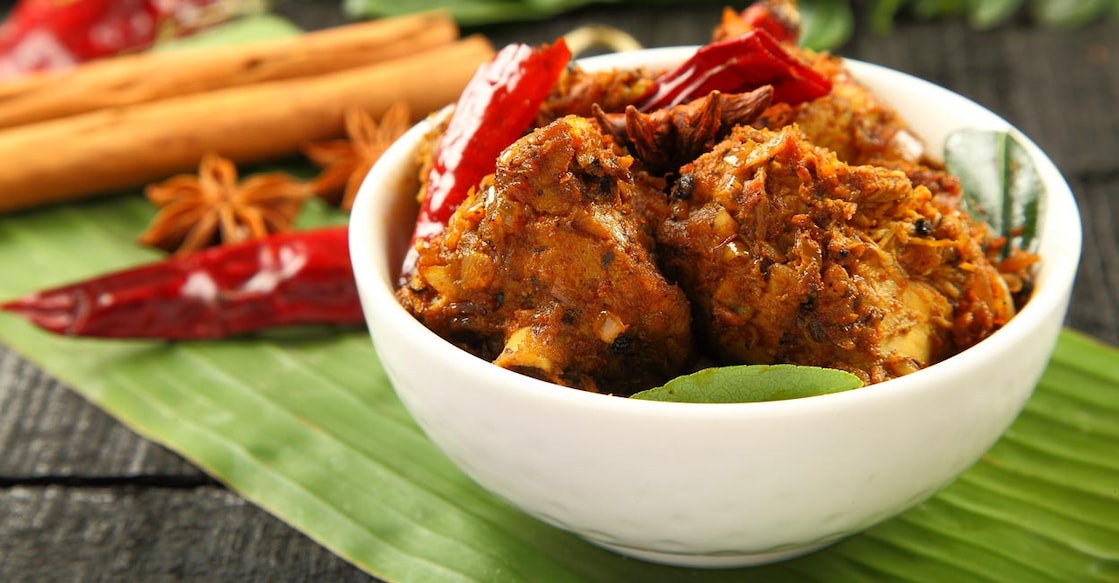The Chettinad Affair!

Mail This Article
What is Chettinad Cuisine?
Chettinad cuisine is the cuisine of the Chettinad region of Tamil Nadu, a cluster of 76 villages in southern Tamil Nadu spanning over an area of 1,500 square kilometres.
A part of this cluster - of about thirty villages – has been nominated for its 'Outstanding Universal Value' by UNESCO. Everything in this Chettinad area, from the palatial old-world houses to the culture and habits and the food and cuisine, is of historical and cultural importance.
People belonging to this region are called the Nagaraththars or town folk since it was they who transformed the villages into something more. They are also called the Naattukkottai Chettiars, or simply, Chettiars.
The Cuisine and its Speciality
Chettinad cuisine uses a variety of spices in its dishes. It is made with freshly ground spices, including star anise, whole red chillies, cinnamon, peppercorns, cumin, fenugreek, fennel, clove, bay leaf, turmeric and tamarind.
Most dishes in this cuisine are served with rice-based preparations like Appams, Idlis, Idiyappams, Adais and Dosais because of the mild taste, which compliments the richness and flavours of the Chettinad dishes.
Some unique points about the cuisine
Chettinad cuisine typically uses more coriander seeds than chilli in its recipes, so it is quite misnomering when people say that Chettinad food is spicy.
It borrows heavily from Asian cuisines. The Chettiar forefathers who travelled across countries such as Burma, Ceylon, Java, Sumatra, and Vietnam brought back recipes from these places, imbibed in today's modern-day Chettinad cuisine.
Traditional Chettinad cuisine is always served on a banana leaf, whereby the number of courses or dishes served for a meal is always odd in number, and this rule is always followed for every meal or feast. A meal on a banana leaf will have either five, seven or eleven vegetables.
There is a specific order to eating a Chettiar meal. Dishes are always plated in a particular order. One always starts with paniyarams and chutneys, followed by vegetables, meats, rice and sambhar, curd rice, and ofcourse, a sweet item.
Chettinad Recipes
We bring to you, the recipes of some lip-smacking and flavourful Chettinad dishes that you can try at home this festive season!
Chicken Chettinad
One of the most popular Chettinad dishes, this delicious chicken curry is prepared with freshly ground coconut along with several spices.
Ingredients
500g chicken
1tsp turmeric powder
2tsp lemon juice
1tsp cumin seeds
1tsp coriander seeds
1tsp fennel seeds
2-3 cloves
2-3 whole green cardamoms
2-3 whole red chillies
5-6 peppercorns
1 Cinnamon stick
1-2 medium-sized sliced onions
A few curry leaves
1tbsp ginger garlic paste
3 finely chopped tomatoes
1 small cup grated coconut
Method
Take a bowl, add the chicken, salt, turmeric powder and lemon juice and mix well. Let it marinate for 15 to 20 mins. This will help in making the chicken soft and reduce the cooking time.
Take a non-stick pan and heat oil over a moderate flame. Once the oil is hot, add cumin seeds, coriander seeds, fennel seeds, whole cloves, cardamoms, whole red chillies, peppercorns, cinnamon and sauté for a few seconds.
Remove the spices from the flame and allow them to cool. Grind the mixture into a coarse grain powder.
In another pan, heat some oil and add the curry leaves. When they stop spluttering, add the sliced onions and ginger-garlic paste and fry till the paste turns light brown.
Add the grounded spice paste and star anise and fry for another 2-3 minutes.
Add the tomatoes and marinated chicken and saute for 10-15 minutes. Stir well to mix all the ingredients so that the spices coat the chicken pieces perfectly.
Add 1/2 cup of water along with grated coconut and mix well. Cover it with a lid and simmer till it is tender. Keep tossing the chicken and add more water if needed to get the desired consistency.
When the chicken is done, add 2 tsp of lime juice, mix well and turn off the flame.
Garnish with some tempered curry leaves.

Karaikudi Eral Masala
A spicy and mouth-watering prawn masala curry made with everyday spices.
Ingredients
400g prawns, cleaned and deveined
½ cup shallots, roughly chopped
2 tomatoes, chopped
2 sprig curry leaves
1 green chilli, slit
1 ½ tsp ginger garlic paste
1 tbsp red chilli powder
1 tsp coriander powder
1 tsp black pepper powder
½ teaspoon turmeric powder
1 tsp lemon juice
Salt to taste
1 ½ tbsp oil
Coriander leaves chopped for garnish
Method
To begin making the Chettinad Eral Thokku Recipe, add salt and lemon juice to the cleaned prawns, mix well and marinate for 15 minutes in the fridge.
Heat oil in a kadhai, add ginger garlic paste and sauté till the raw smell of the paste is gone. Once done, add the chopped shallots, curry leaves and green chillies and cook till onions turn translucent.
After the onions have turned translucent, add the chopped tomatoes. Cook till the tomatoes turn soft and mushy and oil releases from the sides of the pan.
At this stage, add the spices like the red chilli powder, turmeric powder, coriander powder, black pepper powder, salt and stir well to combine.
Add the marinated prawns and mix well, ensure that the prawns are coated well with the masala.
Add 1 tbsp water, mix well and then cover and cook till prawns are fully cooked. If needed, add more water if the masala turns dry. The prawns release some water as well. Keep the heat to medium-high.
Turn off the heat once the prawns are cooked, and the gravy has reached the desired semi gravy consistency. Garnish with fresh coriander leaves and serve Chettinad Eral Thokku hot.

Urlai Roast
This is a semi-spicy roast potato dish made with baby potatoes and Chettinad masala. This dish is also known as Potato Kara curry and is served at a traditional Tamil brahmin wedding.
Ingredients
3 medium-sized potatoes
2 tsp red chilli powder
Salt as required
¼ tsp turmeric powder
2 pinches of asafoetida
A few curry leaves
1 tbsp besan
1 tbsp vegetable oil
¼ tsp mustard seeds
¼ tsp urad dal
¼ tsp chana dal
Method
Boil the potatoes in a pressure cooker and take out the skin. Cut them into big pieces and keep them aside. You can roughly mash it with your hands instead of cutting them.
In a bowl, mix the red chilli powder, turmeric powder, asafoetida, curry leaves, and salt.
Take a pan, add oil and add the mustard seeds, urad dal, and chana dal. When the dal starts to brown, lower the flame, add the red chilli powder mix to the oil, and stir it quickly.
Immediately add the boiled potatoes and mix them well. Let this cook on a medium flame.
Once you see nice golden-brown spots on the potato, sprinkle the besan on the potatoes and mix it well to get an even coating.
Cook it for 10 more minutes on a low flame, till the besan gets cooked, and the raw smell goes off.
Add 1-2 tsp of oil if required to ensure that the potatoes don't stick.

Cabbage and Carrot Poriyal
A healthy and tasty dish made of cabbage and carrot that is stir-fried. Poriyal means' Dry curry' in Tamil.
Ingredients
1 cup of shredded cabbage
1 cup chopped carrots
2 tbsp grated coconut
A few chopped curry leaves
Salt as required
50ml water
1tbsp vegetable oil
1tsp mustard seeds
1tsp urad dal
1tsp chana dal
1 green chilli, slit
1 red chilli, broken
2 pinches of asafoetida
Method
Take a pan, add the oil and the mustard seeds. Let the mustard seeds crackle, add the urad dal, chana dal, red chilli, green chilli, asafoetida and curry leaves.
Add the chopped cabbage and carrot and mix it well.
Once the vegetables shrink in size, add salt as per your taste and saute it nicely.
Pour some water into the pan and cover with a lid.
Let the vegetables cook on a medium flame for about 10 mins.
Once the vegetables have softened, add some freshly grated coconut and chopped coriander leaves.
We hope you are excited to try out these recipes.
Do try making these delicious Chettinad dishes at home, and let us know which one you liked the best from amongst these.
Bon Appetit!


